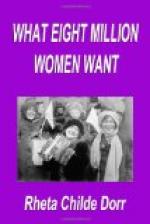In four States of the Union, Washington, Oregon, South Dakota, and Oklahoma, the voters will this autumn vote for or against constitutional amendments giving women the right to vote. It is not very probable that the Suffragists will win in any of these States, not because the voters are opposed to suffrage, but because they are, for the most part, uninformed. The suffrage advocates have not yet learned enough political wisdom to further their cause through education of the voters.
Although enormous sums of money have been spent in suffrage campaigns, in no one has enough money been available to do the work thoroughly. In the four States where the question is at present before the voters, complaint is made that there is not enough money in the treasuries properly to circulate literature.
Many of the wisest leaders in the National Woman Suffrage Association, including Dr. Anna Shaw, Ida Husted Harper, and others, are advising an altogether new method of conducting the struggle for the ballot. They advocate selecting a State, possibly Nebraska, where conditions seem uncommonly favorable, and concentrating the entire strength of the national organization, every dollar of money in the national treasury, all the speakers and organizers, all the literature, in a mighty effort to give the women of that one State the ballot. The vote won in Nebraska, the national association should pass on to the next most favorable State and win a victory there. The moral effect of such campaigns would no doubt be very great.
One of the principal reasons why men hesitate in this country to give the voting power to women is that they do not know, and they rather fear to guess, how far women would unite in forcing their own policies on the country. If an Irish vote, or a German vote, or a Catholic vote, or a Hebrew vote is to be dreaded, say the men, how much more of a menace would a woman vote be. I heard a man, a delegate from an anti-suffrage association, solemnly warn the New York State Legislature, at a suffrage hearing, against this danger of a woman vote. “When the majority of women and the minority of men vote together,” he declared, “there will be no such thing as personal liberty left in the United States.”
[Illustration: SUFFRAGETTES IN MADISON SQUARE.]
Under certain conditions a woman vote is not an unthinkable
contingency.
It has even occurred.
For the edification of the possible reader who is entirely uninformed, it may be explained that women are not entirely disenfranchised in the United States. Women vote on equal terms with men, in four States. They have voted in Wyoming since 1869; in Colorado since 1894; in Utah and Idaho since 1896. They vote at school elections and on certain questions of taxation in twenty-eight States.
While it is true that in the States which have a small measure of suffrage the women show little interest in voting, in the four so-called suffrage States, they vote conscientiously and in about the same proportion as men.




